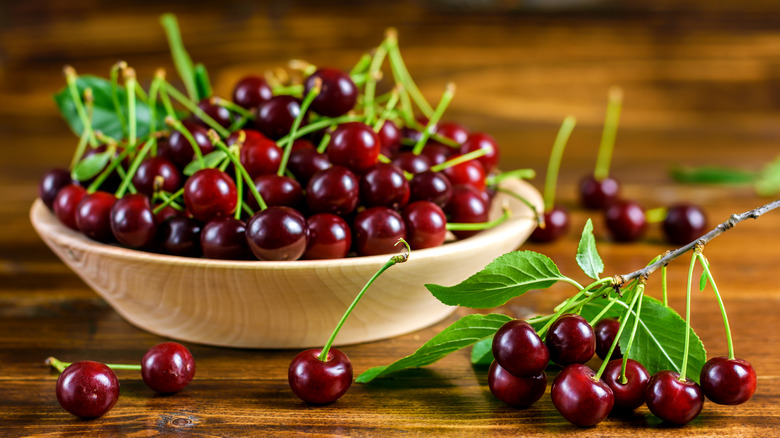There's Evidence That Says This Fruit May Reduce Your Risk Of Gout Attacks
Gout attacks last just a few days, but the pain can be debilitating. Most sufferers experience joint inflammation, tenderness, redness, and sensitivity to touch, notes WebMD. As a result, they often have a hard time working, exercising, or simply moving around. While there is no cure for gout, you may be able to manage its symptoms through lifestyle changes.
For starters, it's important to tweak your diet. Gout is an inflammatory disease, meaning it is important to limit sugar, alcohol, high fructose corn syrup, and other foods that promote inflammation. The American Kidney Fund also advises against the consumption of high-purine foods, such as herring, mackerel, scallops, sardines, mushrooms, and organ meat. Purines are naturally occurring chemicals that increase uric acid levels in the body, explains the American Academy of Family Physicians. A low-purine diet isn't guaranteed to prevent gout attacks, but it may reduce your symptoms.
Ideally, your diet should consist of low-fat dairy, fruits, potatoes, rice, and healthy fats. Shellfish, legumes, oatmeal, poultry, and meat should be consumed in moderation. Other lifestyle changes, such as drinking plenty of water and losing excess weight, may help as well (per WebMD). But there's one fruit that may lower your risk of gout attacks — and you might already have it in your fridge.
Eat this fruit to prevent gout attacks
When was the last time you ate cherries? As it turns out, these colorful fruits may cut your risk of gout attacks by more than one-third, according to a 2013 study featured in Arthritis and Rheumatology. Subjects who ate cherries and took allopurinol, a drug that helps reduce blood uric acid levels, had a 75% lower risk of gout flare-ups. Cherry extract appears to provide similar benefits.
These fruits are rich in anthocyanins, a class of antioxidants with anti-inflammatory properties. They also contain vitamin C, a nutrient that may help lower uric acid levels in the bloodstream, according to the previously mentioned study. There is also evidence that quercetin, a flavonoid in cherries and other fruits, may improve gout symptoms. This compound fights inflammation and oxidative stress, reducing the severity of gout attacks, according to a 2019 study published in Therapeutic Advances in Musculoskeletal Disease.
While not all studies support these findings, cherries can be a healthy addition to most diets. For example, research published in The Journal of Nutritional Biochemistry in 2018 suggests that cherries balance gut flora by increasing the levels of good bacteria in the intestinal tract. Another study found that tart cherry juice may reduce inflammation in people with chronic diseases (via Food and Function).
On top of that, these fruits are simply delicious. Enjoy them raw, mix them into smoothies, or use them in pies, cakes, energy bars, and other homemade desserts to reap the benefits.


